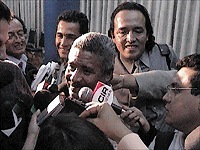|
by Sam Parry
Associate Representative, International Program
The Sierra Club doesn't just defend the environment. We also defend environmentalists. In some cases, we even have to help free them from prison.
 That's what happened in Mexico where, on Nov. 8, President Vicente Fox pardoned two anti-logging advocates, Rodolfo Montiel and Teodoro Cabrera. Convicted of false charges they confessed to under torture, the men had spent the previous 30 months behind bars. That's what happened in Mexico where, on Nov. 8, President Vicente Fox pardoned two anti-logging advocates, Rodolfo Montiel and Teodoro Cabrera. Convicted of false charges they confessed to under torture, the men had spent the previous 30 months behind bars.
Sierra Club members, working with activists from Amnesty International and other groups, campaigned tirelessly on behalf of the men's freedom. In February, the Sierra Club joined noted human-rights advocate Ethel Kennedy on a trip to Mexico to present Montiel with the Chico Mendes Award, the Sierra Club's highest international award for environmental activism. Stephen Mills, director of the Club's International Program, and Alejandro Queral, the Human Rights and the Environment Program director, joined Kennedy in a meeting with President Fox to plead Montiel and Cabrera's case.
In New York, Peter Kirn pushed the New York City Council to pass a resolution condemning the Mexican government for imprisoning Montiel and Cabrera. In Los Angeles, Mercedes Chavez reached out to the local Mexican American population and circulated petitions on Montiel and Cabrera's behalf. In Atlanta, Lee Thomas organized a group of activists from the Sierra Club and other groups that met monthly to take action on our cases. And in Virginia, Tyla Matteson toured the state recruiting and educating new members about the program.
Tragically, Montiel and Cabrera's release followed the murder of their lawyer, Digna Ochoa, who was killed three weeks earlier as she worked in her office in Mexico City. Her death intensified international scrutiny surrounding the Montiel and Cabrera case and forced President Fox's decision.
The Club's work made a difference in this bittersweet victory. That's no surprise. Together with our coalition partner Amnesty International, we have documented again and again how defending the environment requires defending environmentalists.
"We've pointed the finger at those who would oppress people and beat them up in order to ravage their environment," says Queral. "Our members have played a vital role advocating on behalf of our colleagues around the world who are oppressed simply for doing the kinds of things we do every day."
The Human Rights and the Environment Program has also cultivated relationships with members of Congress to speak out on behalf of environmentalists - in particular Reps. Nancy Pelosi (D-Calif.), Cynthia McKinney (D-Ga.), Hilda Solis (D-Calif.), Tom Lantos (D-Calif.), Benjamin Gilman (R-N.Y.), and former Rep. Sam Gejdenson (D-Conn.), who not only took action on their own, but encouraged their colleagues to as well.
The program is reaching out to the next generation of activists on college campuses. In early 2001, the Youth Summit on Globalization brought more than 200 students to Washington, D.C., for a weekend conference on the challenges posed by economic globalization.
With Montiel and Cabrera free, one of the next big challenges is developing new standards that address how corporations and governments operate in the global economy. As the world's biggest consumer, the U.S. has a crucial role to play in promoting sustainability in the face of environmental destruction and human repression.
We need your help to make it happen. To find out what you can do and to get involved, contact Sam Parry at (202) 675-7907 or sam.parry@sierraclub.org.
Photo caption: Free at Last: Rodolfo Montiel answers questions at a press conference in Mexico City after being released from prison. He and fellow anti-logging advocate Teodoro Cabrera spent 30 months behind bars, convicted on false charges they confessed to under torture. The two men had been fighting to stop rampant logging in the southern Mexican state of Guerrero.
More on Responsible Human Rights.
Up to Top
|